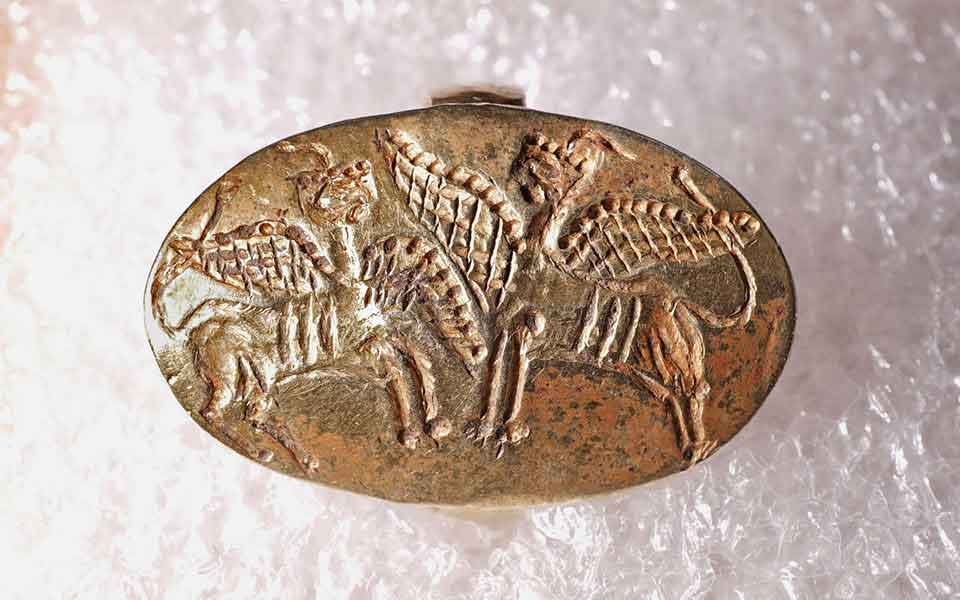A gold sealing ring from Mycenaean times, depicting a pair of sphinxes, has been returned to Greece by the Nobel Foundation in a ceremony held on Thursday, May 19 in Stockholm, according to a statement from the Ministry of Culture.
According to the Ministry, the ring was found in 1927, during the excavations of the Italian Archaeological School in the Mycenaean necropolis of Ialyssos, Rhodes, among the artifacts in Tomb 61. It was kept in the Archaeological Museum of Rhodes, along with other findings from systematic excavations elsewhere on the island. During the Italian Occupation of the Dodecanese in World War II, the ring was stolen from the Museum, along with hundreds of other antiquities, mostly coins and jewelry that remain missing to this day. Attempts at the time to relocate them were fruitless, despite the mobilization of the Archaeological Service and the Police.
Following a trail of clues, the gold Mycenaean ring of Rhodes was eventually found in the United States, where it was purchased in the 1950s or 1960s by Hungarian Nobel laureate Georg von Békésy. After his death in 1972, von Békésy’s entire collection was donated to the Nobel Foundation and the works of art were donated to various museums, depending on their type. The Mycenaean ring ended up in the Museum of Mediterranean and Eastern Antiquities, based in Stockholm.
In 1975, the then Director of the Swedish Museum and distinguished archaeologist Carl Gustaf Styrenius found that the gold sealing ring from the Mycenaean cemetery of Ialyssos was in the Museum’s collection. Whether he informed the competent Greek authorities is not clarified by existing files. The gold sealing ring, almost eight decades after its illegal removal, will be exhibited again at the Archaeological Museum of Rhodes.
According to the Minister of Culture and Sports Lina Mendoni, “following their decision to return the Mycenaean ring to Greece, its country of origin, the Nobel Foundation and the Swedish State show their respect for modern Greece and the ongoing efforts we make for combating the illicit trafficking of cultural property. We are grateful for this gesture. It is an example of ethics and generosity for other institutions and museum organizations around the world.”
“It was obvious to us that the ring had to be returned. This work has a great cultural and historical value for Greece,” said Vidar Helgesen, Executive Director of the Nobel Foundation, who handed over the ring to Elena Vlachogianni, Head of the Department of Documentation and Protection of Cultural Property of the Ministry of Culture.
According to the Ministry of Culture, in the context of the search for information on the missing antiquities from World War II, a project that has been in progress in recent years, the Documentation Directorate shook the case, sought and collected data from the archive of the Ephorate of Antiquities of Dodecanese, the Historical Archive of Antiquities, and from every other available source. The gold ring was fully documented as stolen from the Rhodes Museum and the procedures for its claim began.
In close cooperation with the Ministry of Culture and Sports, the Greek Embassy in Stockholm undertook negotiations with the Museum of Mediterranean and Eastern Antiquities and the Nobel Foundation. The two Swedish institutions welcomed the Greek request from the beginning and willingly provided archival material, as well as any facility for the progress of the negotiations. In this context, the ring was examined by experts of the National Archaeological Museum, who went to Stockholm for this purpose, and its identification was confirmed, paving the way for his repatriation.
This article was previously published in Greek at kathimerini.gr.











